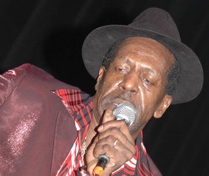By now you would have already learned of the death of one of Reggae music finest, Gregory Isaacs.
Isaacs died yesterday (Oct 25) at his home in London at age 59, after a year long battle with cancer. News if his death dominates social media giants facebook and twitter and also search giant Google trends, as millions of fans grapple with news of his passing. But lets take a look into the life of the legendary Cool Ruler.
Isaacs was born in Fletcher’s Land, Kingston, Jamaica. His father left for the US during his childhood, so Gregory and his younger brother, Sylvester, were raised by their mother in the rough streets of nearby Denham Town. Showing a natural aptitude for singing, Isaacs began making an impact on talent contests during his teens (often as a duo with Sylvester). He was inspired by stars such as Sam Cooke and Otis Redding, as well as local acts including Alton Ellis and the Melodians, but named his mother as his first vocal role model, since he used to hear her singing while she ironed.
In 1968, Isaacs recorded and produced a duet, Another Heartache, with an aspiring singer from the neighbourhood, Winston Sinclair, but the song sank without a trace. His next effort, Ballroom Floor, was recorded for Prince Buster, after receiving a personal recommendation from a local gangster, Lester Lloyd Coke (aka Jim Brown). In the same era, Isaacs sold marijuana on behalf of Toddy Livingston, father of the singer Bunny Wailer.
Isaacs subsequently formed a trio, the Concords, with two other hopefuls, recording a number of impressive tunes for Rupie Edwards in 1969, of which the most notable was Don’t Let Me Suffer. Other stirring solo singles, such as Too Late and Lonely Man, followed. By 1970 he had formed the independent label African Museum with a fellow singer, Errol Dunkley. They found instant success with Dunkley’s Movie Star and Isaacs’s moderately popular My Only Lover (featuring the Wailers’ backing band), before Dunkley broke away to found his own label. Isaacs’s first substantial hit, All I Have Is Love, was produced by a perceptive downtown promoter, Phil Pratt, in 1973. The following year, he scored an even bigger hit with Love Is Overdue, the first of several for the producer Alvin “GG” Ranglin, who soon issued Isaacs’s debut album, In Person (1975).
As his songwriting skills matured, Isaacs shifted focus to address social injustice, in work that expressed longing for his ancestral African homeland, and grew dreadlocks as a sign of his commitment to the Rastafari faith. At Lee Perry’s Black Ark studio, he cut the anthem-like Mr Cop in 1976 and the censorious Black Against Black, which decried self-destructive ghetto violence. After the release of the self-produced concept album, Mr Isaacs (1977), he received a major career boost in 1978 by signing to Virgin Records for the album Cool Ruler and making an appearance in the feature film Rockers. The 1979 Virgin follow-up, Soon Forward, included the chart-topping Mr Brown and a popular title track which was one of the first recordings to make use of the production skills of Sly and Robbie.
A shift to Charisma Records’ subsidiary Pre in 1980 brought the album Lonely Lover and its follow-up, More Gregory, the latter featuring the Jamaican chart success Top Ten. Both albums were backed by the Roots Radics band, with whom Isaacs toured the UK in 1980-81. Night Nurse (1982), issued by Island, was his most commercially successful set to date, but just as he reached a pinnacle of popularity, problems arose. He was imprisoned in Jamaica following the discovery of an unlicensed firearm at his home, and he also served time for cocaine possession. He addressed his experiences of prison in the subsequent Island release, Out Deh! (1983).
After recording the relaxed Private Beach Party album for the producer Gussie Clarke in 1985, he cut less impressive work for a number of relatively unknown producers. Then, in 1987, another cocaine bust prompted him to go into rehab. This was followed by a more productive period that peaked with the release of Red Rose for Gregory (1988), a hit dancehall album issued by Clarke, and featuring the outstanding single, Rumours.
Although Isaacs would score a few more Jamaican chart hits, record for the British label Acid Jazz, open a recording studio in Jamaica, and launch the singing career of his son Kevin, he continued to use drugs. This resulted in several patchy releases, the loss of a number of his teeth, and a reputation for unreliability. Nevertheless, he maintained a loyal fan base, both at home in Jamaica and overseas.
Gregory Isaacs is survived by his wife Linda and several children and grand children.
• Gregory Anthony Isaacs, singer, songwriter and record producer, born 15 July 1951; died 25 October 2010
Your comments below

is linda his real wife? he was never oficcially divorced from June Wyndam